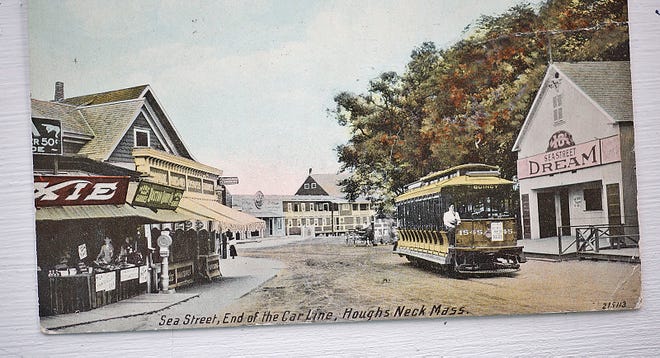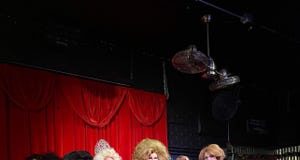QUINCY – After Hyde Park native Patti Williams moved to Houghs Neck 20 years ago, she became so interested in the history of her adopted home that she spent hundreds of hours researching the peninsula’s early landowners, businesses and social trends.
At one point, she planned to write a book about the neighborhood, but this past summer she realized that would take too long and she wanted to share all her knowledge right now. It was too good to sit on anymore, she said.
On Tuesday, Sept. 13, Williams, 74, will launch a series of eight talks on the history of the neighborhood at the Houghs Neck Congregational Church at 310 Manet Ave.
Each talk will run from 7 to 8:30 p.m. with slides, photographs, books and at least one special guest appearance. The free program is offered in conjunction with the Seaside Social Club, formerly the Mothers Club, at the church.
“I am especially happy to be doing these talks in Houghs Neck,” rather than somewhere else in Quincy, Williams said.
Many Houghs Neck residents have told her stories about their memories and she has received extensive help in her research from Peter Sault, a Houghs Neck native. The retired long-distance truck driver spent many hours at the Thomas Crane Library reading through decades of early Quincy newspapers on microfilm.
‘A blaze of parties’:In the Gay Nineties, summer ended with a bang in Houghs Neck
“Much of the information I have used as a foundation has come from old newspaper articles,” Williams said. “I have hundreds of articles from the Patriot and the Ledger from 1876 through 1910.”
Schedule of talks
Sept. 13: Shipbreaking at Houghs Neck:1884-1904. Shipbreaking was the practice of taking apart old ships to retrieve usable parts. Discarded sections were burned. Nut Island was often the site for industrial purposes such as this because the tides would bring the ships in close to shore and wash away debris.
Oct. 20: Mapping Houghs Neck: 1637-1900. Williams found a variety of old maps through the Quincy Historical Society and the Warren Parker Collection at the Thomas Crane Library. Some were official; others were more like plans and sketches.
Nov. 15: George Morton: 1841-1911. Morton was the man most responsible for the development of Houghs Neck. His father started the Quincy Mutual Fire Co. He spearheaded the Manet Street Railway, which transformed Houghs Neck from a farming to a residential community.
Dec. 6: People of Houghs Neck: 1637-1900. Brief biographical sketches of Atherton Hough, the Babcock family, the Spear family, Jim Mears, Chapin Thayer and other significant influences on the area and developers of Houghs Neck.
March 2: Nut Island: 1637-1900. Now part of the Boston Harbor Islands National Recreation Area, this island at the end of Houghs Neck has a beautiful park, a well-used fishing pier, a sewage transfer station and a history of strong community spirit. Williams believes Nut Island has determined the fate of Houghs Neck, through the location of the sewer line and its role in development of modern artillery.
April 25: The Littlefield Farm: 1859-1889. Williams volunteered at the Quincy Historical Society and discovered a cache of papers from the George and Rufus Littlefield Farm near 1162 Sea St. The papers laid out the farm’s economic and social history from 1877 to 1890.
May 18: The Hotels of Houghs Neck: 1856-1935. In the “Gay Nineties,” the 1890s, Houghs Neck was the place to be for its selection of hotels and beautiful beaches. The Patriot Ledger Summer Series recently explored this story as well.
June 1: Building the High-Level Sewer Line: 1899-1904. The “dike” or above-ground sewer line is included because “putting in the pumping station had a profound impact on the community.” Williams has dramatic metropolitan sewer commission photos of the building process from 1900 to 1904.
“I’ve spent so much time doing this research that I am just glad people are finally going to hear it,” she said. “I have great photographs and maps of the time.”
Thanks to our subscribers, who help make this coverage possible. If you are not a subscriber, please consider supporting quality local journalism with a Patriot Ledger subscription. Here is our latest offer.








